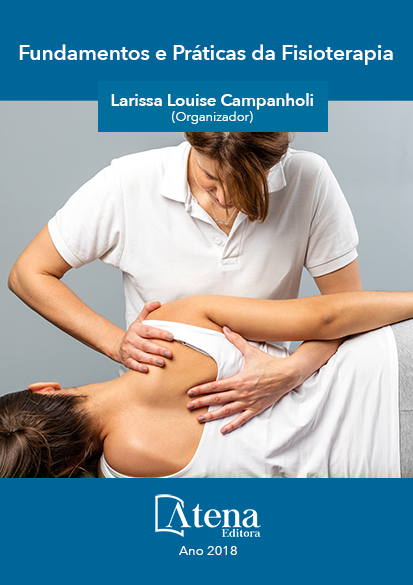
A ATUAÇÃO DA FISIOTERAPIA NA INCONTINÊNCIA URINÁRIA: REVISÃO SISTEMÁTICA
Introdução: A incontinência Urinária
é definida como a perda involuntária da urina,
atingindo principalmente o sexo feminino,
interferindo diretamente na qualidade de vida.
Objetivo: Identificar a prevalência do tipo de
incontinência urinária presente na literatura e
verificar a intervenção fisioterapêutica proposta.
Método: Foi realizada uma revisão sistemática
da literatura, por meio da busca na base de
dados SCIELO, com os descritores em saúde:
incontinência urinária, tratamento, fisioterapia.
Foram incluídos na pesquisa, artigos da língua
portuguesa, dos últimos dez anos (2007 a 2016)
com a temática presente; e excluídos os artigos
de revisão bibliográfica. Ao final da pesquisa,
90 artigos foram encontrados, destes, 23 foram
selecionados por estarem dentro dos critérios
da pesquisa. Resultados: No total, 23 artigos
foram selecionados por estarem dentro dos
critérios da pesquisa. Obteve-se a prevalência
de 48% de IU de esforço, e 21% associadas
a outros tipos. Na amostra, 35% realizaram
somente avaliação e 65% tratamento. Sobre as
condutas abordadas estão: eletroestimulação
(13%), exercícios de kegel/cinesioterapia (8%),
biofeedback (9%), e condutas associadas
(35%), que demonstraram melhora significativa
nos MAP, influenciando na diminuição da perda
involuntária de urina; assim como a melhora na
qualidade de vida. Conclusão: A incontinência
Urinária é uma disfunção caracterizada pela
perda involuntária de urina que desencadeia
limitações/incapacidades dos indivíduos
acometidos. Mediante ao exposto, observouse
a importância da fisioterapia no tratamento
conservador da IU, seja de caráter reabilitador
ou preventivo, no intuito de minimizar os
sintomas e promover o restabelecimento da
funcionalidade dos MAP, que influência não
somente nos fatores biológicos, mas sociais e
emocionais.
A ATUAÇÃO DA FISIOTERAPIA NA INCONTINÊNCIA URINÁRIA: REVISÃO SISTEMÁTICA
-
DOI: atena
-
Palavras-chave: incontinência urinária; tratamento; fisioterapia
-
Keywords: urinary incontinence; treatment; physiotherapy
-
Abstract:
Introduction: Urinary incontinence
is defined as involuntary loss of urine, mainly
affecting the female sex, directly interfering with
quality of life. Objective: To identify the prevalence of the type of urinary incontinence
present in the literature and to verify the proposed physiotherapeutic intervention.
Method: A systematic review of the literature was carried out, through the search in
the SCIELO database, with the descriptors in health: urinary incontinence, treatment,
physiotherapy. Included in the research, articles of the Portuguese language, of the
last ten years (2007 to 2016) with the present theme; and excluded bibliographic
review articles. At the end of the research, 90 articles were found, of which 23 were
selected because they were within the research criteria. Results: Of the 23 articles,
the prevalence of 48% of effort UI was obtained, and 21% were associated with other
types. In the sample, 35% performed only evaluation and 65% treatment. The following
behaviors were studied: electro stimulation (13%), kegel / kinesiotherapy exercises
(8%), biofeedback (9%) and associated conducts (35%), which showed a significant
improvement in MAP, influencing the reduction of involuntary urine; as well as the
improvement in the quality of life. Conclusion: Urinary incontinence is a dysfunction
characterized by the involuntary loss of urine that triggers limitations / incapacities of
the affected individuals. Through the above, the importance of physiotherapy in the
conservative treatment of UI, either rehabilitating or preventive, was observed in order
to minimize symptoms and promote the reestablishment of MAP functionality, which
influences not only the biological, social and emotions.
-
Número de páginas: 15
- Brenda Stefany de Campos Chaves


